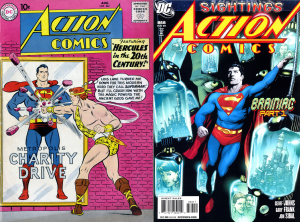Terms, codes and jargon that new readers may want to know...
From 1954 to 2011 US comic books publishers had an industry run body to administer self regulation - and censorship - of comics. They Authority administered a series of guidelines, which were required to be followed to get the seal (shown above). Failure to get a seal would stop sales in some venues and lose advertisers.
Stemming from Fredric Wertham's study "The Seduction of Innocents" and Senator hearings which linked comic books to child delinquency, it started out as a draconian set of guidelines, stopping all manner of things:
- Violence & gore.
- Portrayals of corruption by authorities.
- Portrayal of the death of law enforcement officers.
- Sympathetic portrayal of villains.
- Drug use.
- Seduction.
- The use of vampires, zombies and werewolves.
- The use of "Horror", "Terror" and "Crime" it comic book titles.
At a time when comics were already suffering low sales, the last 2 lead to the death of horror comics and crime and detective fiction and romance comics didn't fare much better and lead to the main genre left in the field being superheroes and lead to the Underground Comics movement of the 60s and 70s.
The code was updated and weakened in early 1971, but later that year Marvel, at the request of the US Government did a story about the dangers of drugs. The CCA refused to give it the seal, and Marvel published
The Amazing Spider-man #96 - 98 without the seal, leading to the code to be revised again.
Although the Code continued to adapt, companies began to regularly publish non-code comics, including DC creating Vertigo an imprint dedicated to Mature Reader stories. Over time the seal was de-emphasised, becoming smaller, and eventually colored like the background making them harder and harder to see.
 |
| Action Comics with seal 1960 & 2008 |
In 2001 Marvel dropped the seal entirely changing to their own MPAA-inspired system. Then changed their rating system again soon after when the MPAA said the system breached their trademark. In 2011 the last two companies using the Code - DC and Archie dropped it completely ending the Authority's authority.
~ DUG.
